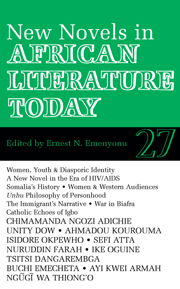Book contents
- Frontmatter
- Contents
- Notes on Contributors
- EDITORIAL ARTICLE: The African Novel in the 21st Century: Sustaining the Gains of the 20th Century
- ARTICLES
- Resurgent Spirits, Catholic Echoes of Igbo & Petals of Purple: The Syncretised World of Chimamanda Ngozi Adichie's Purple Hibiscus
- Ambivalent Inscriptions: Women, Youth & Diasporic Identity in Buchi Emecheta's Later Fiction
- The Interrupted Dance: Racial Memory in Isidore Okpewho's Call Me By My Rightful Name
- The Ivorian Crisis & Ahmadou Kourouma's Posthumous Political Novel Quand on Refuse on dit non
- Ngũgĩ's Wizard of the Crow: Women as the “Voice of the People” & the Western Audience
- The Ankh & Maat: Symbols of Successful Revolution in Ayi Kwei Armah's Osiris Rising
- A New African Youth Novel in the Era of HIV/AIDS: An Analysis of Unity Dow's Far & Beyon'
- The Prison of Nigerian Woman: Female Complicity in Sefi Atta's Everything Good Will Come
- Manufacturing Skin for Somalia's History: Nuruddin Farah's Deep Hurt in Links
- A Zimbabwean Ethic of Humanity: Tsitsi Dangarembga's The Book of Not & the Unhu Philosophy of Personhood
- ‘Coming to America’: Ike Oguine's A Squatter's Tale & the Nigerian/African Immigrant's Narrative
- Chimamanda Ngozi Adichie's Half of a Yellow Sun
- REVIEW
- Index
Manufacturing Skin for Somalia's History: Nuruddin Farah's Deep Hurt in Links
from ARTICLES
Published online by Cambridge University Press: 05 April 2013
- Frontmatter
- Contents
- Notes on Contributors
- EDITORIAL ARTICLE: The African Novel in the 21st Century: Sustaining the Gains of the 20th Century
- ARTICLES
- Resurgent Spirits, Catholic Echoes of Igbo & Petals of Purple: The Syncretised World of Chimamanda Ngozi Adichie's Purple Hibiscus
- Ambivalent Inscriptions: Women, Youth & Diasporic Identity in Buchi Emecheta's Later Fiction
- The Interrupted Dance: Racial Memory in Isidore Okpewho's Call Me By My Rightful Name
- The Ivorian Crisis & Ahmadou Kourouma's Posthumous Political Novel Quand on Refuse on dit non
- Ngũgĩ's Wizard of the Crow: Women as the “Voice of the People” & the Western Audience
- The Ankh & Maat: Symbols of Successful Revolution in Ayi Kwei Armah's Osiris Rising
- A New African Youth Novel in the Era of HIV/AIDS: An Analysis of Unity Dow's Far & Beyon'
- The Prison of Nigerian Woman: Female Complicity in Sefi Atta's Everything Good Will Come
- Manufacturing Skin for Somalia's History: Nuruddin Farah's Deep Hurt in Links
- A Zimbabwean Ethic of Humanity: Tsitsi Dangarembga's The Book of Not & the Unhu Philosophy of Personhood
- ‘Coming to America’: Ike Oguine's A Squatter's Tale & the Nigerian/African Immigrant's Narrative
- Chimamanda Ngozi Adichie's Half of a Yellow Sun
- REVIEW
- Index
Summary
Nuruddin Farah wrote in 1988 that the overall theme of his novels is ‘truth versus untruth’ and his aim in writing them is to ‘put down on paper, for posterity's sake, the true history of a nation’ (Farah 1988: 1599). Although Farah's fictional style has changed over time, he has held on steadfastly to his involvement with the Somali nation and its social and political history. His Dictatorship trilogy is a searing critique of the repressive regime of Syed Barre, in which he exposes the untruth of the official truth and its baneful effect on ordinary lives. Though some critics have noticed a change in his concerns in the Blood and Sun trilogy, because Maps marks a shift from what Derek Wright calls ‘political geography to psycho-physiology, from powerscape to mindscape’ (1990 33), it still remains true that Farah intertwines the dilemmas of individual lives with serious concerns of identity, loyalty, and nationhood in its novels, which provides an extra edge of complexity to them. Some other critics, in fact, consider the last novel of the trilogy, Secrets, to be Farah's Things Fall Apart (Alidou and Mazrui 2000: 122–8).
In Links, the political condition of Somalia and its effect on individual lives take the centre-stage. In a way, it is a continuation of what Farah started in Secrets, which is set during the start of the civil war in the country.
- Type
- Chapter
- Information
- New Novels in African Literature Today , pp. 103 - 116Publisher: Boydell & BrewerPrint publication year: 2009



